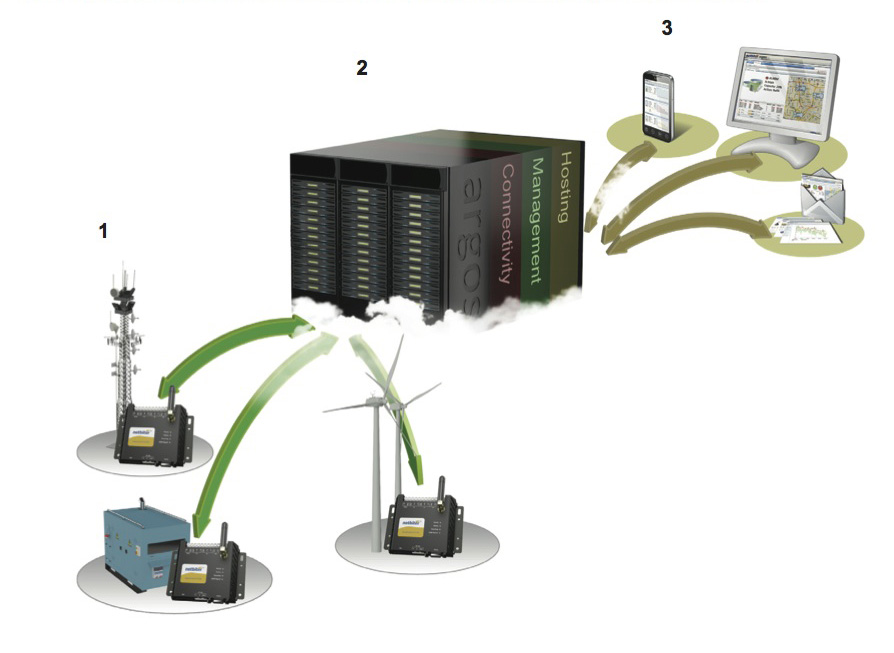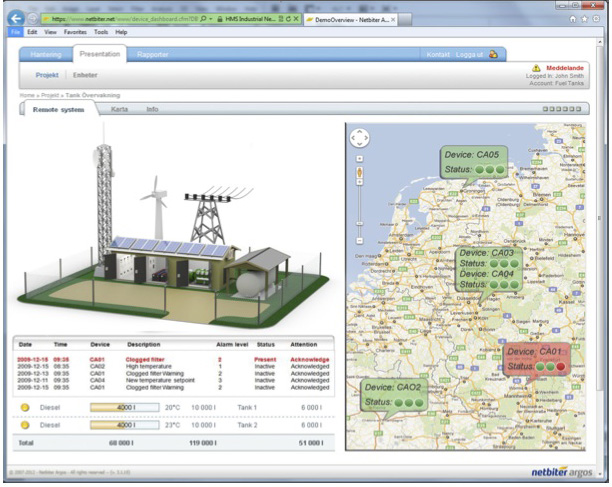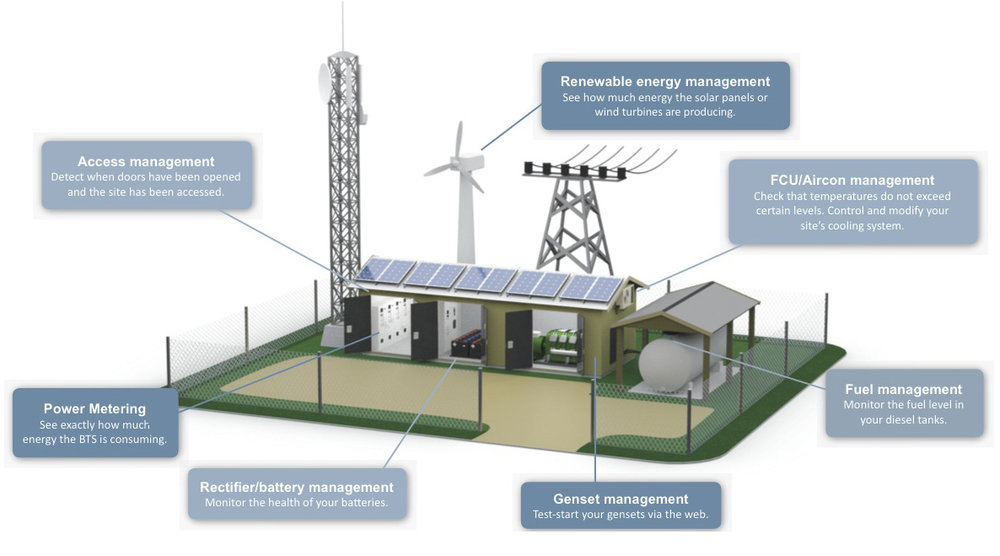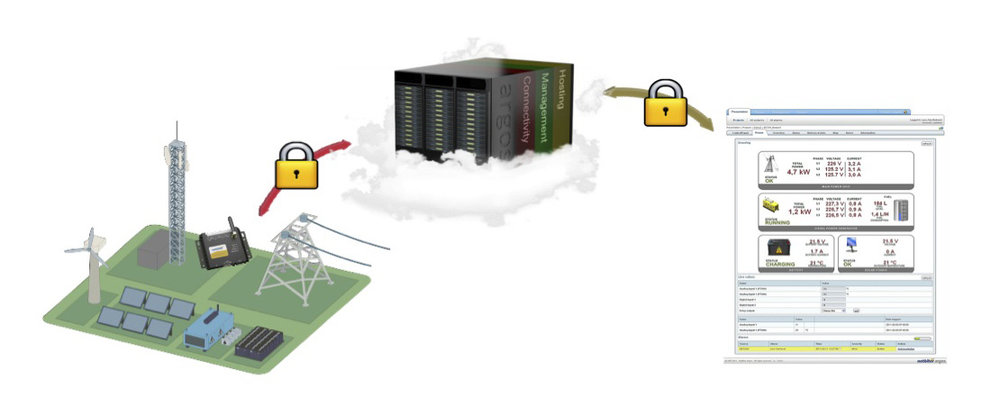REDUCING OPERATING COSTS OF TELECOM BASE STATIONS WITH REMOTE MANAGEMENT
As more and more people rely on mobile communications in their daily lives, the pressure on telecom infrastructure is increased. We want telecom base stations to achieve higher performance while decreasing operational costs. This can be a real challenge, especially in rural and scarcely populated areas where we might lack a well-developed power grid and the nearest service technician is miles away.

There are many actions that can be taken to improve operations and reduce costs, for example using newer energy-efficient equipment and integrated power management systems to use power more efficiently. These actions may work well when a new site is being built, but the investment may be harder to justify on existing sites as it requires replacing existing, well-functioning equipment with new.
So what can be done to improve operations and reduce operating costs on our existing sites? These are some of the questions we will answer in this whitepaper.
Five ways to cut operating expenses on telecom infrastructure
There are many things that can be done to improve the operation of existing telecom sites, but the key factor to successfully be able to reduce operational costs is information. By understanding when, how and if equipment is operating, we are able to make better decisions regarding site maintenance and take actions when necessary.
Below are five examples of how access to information helps us make better decisions and reduce operating costs.

1) Energy metering – the key to making the right decisions
By adding intelligent energy meters (sometimes referred to as smart meters) at strategic locations in your site, you will get a detailed overview of how much energy each part of your BTS is consuming. For example, with an AC meter installed directly after the mains, and DC meters which measure the consumption of the telecom load, you can easily calculate the site’s Energy Efficiency Ratio (EER).
Additionally, energy meters can be added to individual equipment (the air-conditioning for example) to see how it is performing and when it is time to do maintenance.
The results will help you identify what kind of energy efficiency measures to take.
2) Perform service when needed
A lot of the equipment used within a telecom site (for example air-conditioning units, diesel power generators, etc.) requires regular service to operate reliably. Telecom sites are often serviced according to a pre-determined service schedule. As site visits are costly, we may be able to reduce the service costs if we only send the service team to sites that actually need service.
The challenge is to know when service is needed at each individual site. By analyzing the operation of equipment remotely, we are able to understand equipment health and more efficiently schedule service visits in the field.
3) Increase lifetime of batteries.
Batteries have a limited lifetime which depends greatly on how they are operated as well as the surrounding temperature. With a temperature that is just a couple of degrees higher or lower than the optimal operating temperature, the lifetime of batteries is significantly reduced. And since batteries are expensive, this can generate substantial savings.
Normally, an FCU in combination with an air-conditioning unit is installed to regulate the temperature on site. Outdoor temperature fluctuations, equipment failure or even a door that has not been properly shut, will affect the temperature at the site and thereby generate unnecessary energy consumption. By recording the temperature at each site and monitoring and configuring temperature set-points remotely, we can assure an optimal climate inside the BTS and extend battery lifetime.
4) Improve reliability and operation of diesel power generators.
Diesel power generators are often used for back-up power at telecom sites. In rural areas, the luxury of a reliable power grid might not be present, and in such cases the diesel power generator acts as the main source of power, occasionally combined with renewable energy sources, such as wind- or solar-power.
A great percentage of generator failures can be avoided by simply analyzing the basic operational parameters, such as fuel levels, battery levels, oil-pressure and coolant temperatures.
Service of a power generator is normally carried out at certain intervals, for example after operating the generator for a certain number of hours. By being able to see the operating hours remotely, we are able to make a decision of when to send a service engineer to the site.
Like a car that has been parked for an extended period, a generator engine that has not run in a long time is likely to have start-up problems. For back-up power generators that are not operated very often, it is important to regularly perform test starts. Remote test starts can be made with a remote monitoring solution that has control capabilities and is connected to the generator controller. With a simple action such as a remote test run, we are able to increase the likelihood of the generator working the day there is a power outage and the generator needs to perform.
A well-maintained generator operates better and with lower costs as unplanned operating disturbances often means substantial expenses.
5) Minimize fuel theft.
Fuel theft can be a significant problem and reports have suggested that in certain regions, as much as 40% of the fuel disappear before it is used.
Avoiding fuel theft completely might be difficult since it is often stolen a bit at a time; during transportation, at fill-up, or at the telecom base station. However, a remote monitoring system that connects to a fuel sensor can be used to ensure that the right amount of fuel is delivered at a refill. By using an intelligent level sensor, it is possible to track the fuel level of the tank. The fuel sensor can be calibrated to sense a full tank and by knowing this we can verify that the tank is properly refilled. A good fuel level sensor is able to detect variations down to 3-5 liters.
An abnormal decrease in content may be detected and indicate that the fuel is being stolen. With a remote monitoring system that supports alarms, a notification is sent immediately as the theft occurs. Even if it might be hard to catch the thieves, we are at least aware that the fuel has been stolen and we can schedule a refill to ensure the generators have the fuel needed to operate.
Tracking the level of fuel in a tank remotely increases our awareness of what happens to the fuel on site and helps us understand when theft occurs. In some cases, where organized theft is common, this may help detect patterns and take action.
Remote monitoring puts you ahead of the game Modern remote monitoring technology enables us to get instant access to data from equipment in the field and take action based on the information. This enables us to have full control 24/7 and creates instant awareness of any operational issues.
To get this information, we need to gather it from the field equipment to a data center where it can be stored and accessed. The next chapter describes how this process works
2. How remote management works
There are three main elements to a modern remote monitoring solution. The first is the physical layer that comprises of a communication gateway that links to your equipment, acquires the data, and communicates it to the remote server. The second is the remote server that collects and stores the data, and the third is software services that provide secure access to the data through a user interface.

a. Communication gateways Communication gateways are devices that handle the connection to the device or equipment being monitored. The connection is generally through serial or Ethernet based communication link using protocols such as Modbus RTU, Modbus TCP, SNMP, etc.
A common challenge to solve is access to the remote sites as many solutions require open ports in firewalls or VPN based connections to the field installations. It is normally better to avoid such solutions as open ports in a firewall reduces the protection of the site and VPN based access may give access to other components that what the connection may be intended for. A more secure method is to use a solution where the communication gateway initiates the communication to the remote server (only outgoing TCP/IP connections need to be open) and also uses communication protocols that only map selected data from selected devices to the remote server instead of open transparent access to the field site.
It may also be a good decision to use a solution which allows communication gateways to be pre-configured for the intended application. Such solutions make installation simple and require no programming or IT expertise at the time of installation and makes solutions are easier to deploy in the field.
Remote monitoring offer secure access to field data from remote sites
b. Central server Acquired data as well as information regarding events occurring in the field are sent to the management server by the communication gateway at selected logging intervals as demanded by the application. To communicate with the server, gateways generally use either quad-band GSM/GPRS, 3G or Ethernet based communication using TCP/IP based protocols.
Information held on this server can be displayed graphically in the form of customized dashboards (see below), or downloaded into the customer’s businesses management system for analysis and reporting.
c. Graphical dashboards Information stored on the remote server can be presented using a standard web browser or integrated with other applications used for monitoring the field sites or applications handling logistics.
There are normally several different tools and functions available at the server to simplify configuration of a graphical display, customize reports or functions to provide access to the data stored on the server. A configuration can be packaged as a pre-configured profile that can be deployed to sites in the field and present a common user interface with information presented in the same way for each site.

Example of a typical web-based dashboard
4. What information can you get from your telecom base stations?
Remote monitoring can be used to monitor and control all the equipment that supports the operation of a telecom site (often referred to as passive equipment). There are normally three different applications of the remote management solution:
Fault management – the ability to detect a critical event at the site and use the information to take action.
Configuration management – the ability to adjust equipment at the site to achieve optimal operation.
Performance management – the ability to measure how the system is performing and reduce energy consumption as well as optimize operation.
Below are some examples of what can be monitored and managed remotely: Grid power
- Grid power
- Energy consumption
- Status of diesel generator and fuel tank
- Battery power
- Solar panels
- Wind turbines
- FCU and air conditioning
- Sensors (such as temperature, humidity, door sensor, water leak detection sensor, etc.)

In other words, remote monitoring makes it is possible to monitor everything that keeps the base station running.
Renewable energy management
See how much energy the solar panels or wind turbines are producing.
Access management
Detect when doors have been opened and the site has been accessed.
FCU/Aircon management Check that temperatures do not exceed certain levels. Control and modify your site’s cooling system.
Fuel management
Monitor the fuel level in your diesel tanks.
Power Metering
See exactly how much energy the BTS is consuming.
Rectifier/battery management Monitor the health of your batteries.
Genset management
What to gain with remote monitoring
- Ensure that the base station has constant supply of power and measure energy consumption.
- Ensure that the back-up power (diesel generator, batteries etc.) is ready to kick in if needed.
- Reduce on-site scheduled and emergency service visits.
- Receive and direct alarms to service personnel whenever certain thresholds are reached.
- Generate reports on how different equipment is performing and analyze over time.
4. What about security?
Establishing a secure communication path with a remote monitoring solution requires solving a number of technical challenges (such as secure access through firewalls). Moving data off-site raises concerns over both its security and availability. By using solutions that are “firewall-friendly” and restricts communication to only the intended data, it is possible to limit the amount of information that can be access and reduces the possibilities of misusing the remote access. Most remote monitoring solutions also use encrypted communication to avoid eavesdropping on the data exchange.
Another method to ensure the security of wireless communications over GPRS or 3G, dedicated SIM cards with private APN. This means that it is not possible to ping or try to access the remote site except through any other link than the intended connection to the data center.
Data storage at the remote server also needs protection. It is common practice to regularly perform so called penetration tests of the remote server to ensure the security protection is up to date and detect any security holes.
Access to the remote monitoring system is normally centrally controlled and requires authentication. Multi-level password layers are used to provide permissions to access different functions, and the server authenticates users and ensures their correct access levels. The server may also record all user access as well as attempted access.

A secure and reliable remote management solution requires encryption both from the base station to the data center and between the data center and the web page.
Custom-made remote monitoring systems are often costly to develop and time-consuming to deploy. A ready-made remote solution makes it possible to quickly deploy solutions at a lower cost.
By using a solution such as Netbiter from HMS Industrial Networks, it is possible to deploy a test installation within a couple of days. This helps make a quick return on investment (ROI). The cost of a communication gateway is normally less than the average cost of a service visit and by cutting down on travelling, it is also possible to reduce a company‘s carbon footprint and only do service visits when really needed.
Remote monitoring may not be the answer to all supervision issues at telecom base stations, but its secure performance and potential to reduce operating costs is likely to have a major impact.
Authors:
Henrik Arleving, Product Line Manager
Jürgen Bischhaus, Business Unit Manager – Telecom Infrastructure & Energy
HMS Industrial Networks

